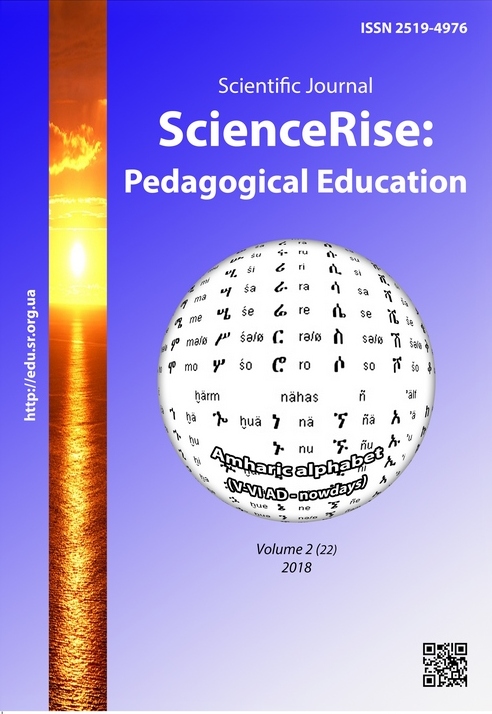Formation of methodical readiness of the future teachers of music based on the praxeological approach
DOI:
https://doi.org/10.15587/2519-4984.2018.124459Keywords:
future teacher of music, methodical readiness, praxeology, criteria of methodical readiness, components of methodical readinessAbstract
The article analyzes the state of the formation of the methodical preparedness of the future teachers of music based on the praxeological approach. We suggest pedagogical praxeology as methodological basis for mastering the skills of professional functioning in the educational space, the prerequisite for the formation of methodological readiness.
The analysis of scientific sources on the peculiarities of the music and pedagogical activity of the future music teacher, the approaches to the content and structure of the methodical preparedness of the specialists made it possible to clarify the essence of the structure of the methodical preparedness of the future music teacher as the dynamic integrity of the interconnected individual, personal and vocational qualities that integrally reflects the personality-professional characteristic of the individual.
The developed system of methodical preparation of the future music teacher is represented by: structural components (motivational-value, cognitive-reflexive, creative-conative, emotionally-volitional and communicative-asertive); criteria of assessment (the degree of formation of incentives and value orientations to mastering the methodical activity, the degree of understanding the essence, characteristics and requirements of methodological activity, the degree of ability to creatively implement effective methodological activity, the degree of formation of emotional-volitional involvement in the methodological activity, the degree of mastery of communicative activity based on assertiveness); functional components of the system (analytical-design, competent-prognostic, demonstration-transformational and artistic-performing); levels of preparedness (formally imitative, reproduced-productive, adaptive-constructive and creative-interpretative) and quality of preparedness (productivity, efficiency, effectiveness, success).
The singled out criteria allowed us to establish that none of the students has a methodical preparedness at the creative and interpretative level, 37.5% adaptive-constructive level, 37.5% reproduced-reproductive and 25% formally imitative. This fact indicates the need to develop pedagogical conditions for the formation of methodical readiness of the future teachers of music based on their acquisition of individual methodological experience in the educational process by the method of teaching musicReferences
- Zavalko, K. V. (2014). Metodolohiya formuvannia hotovnosti vchytelia muzyky do innovatsiynoi diyalnosti. Kyiv: Tsentr navchalnoi literatury, 266.
- Kozyr, A. V. (2008). Profesiyna maisternist uchyteliv muzyky: teoriya i praktyka formuvannia v systemi bahatorivnevoi osvity. Kyiv: Vyd-tvo NPU im. M. P. Drahomanova, 380.
- Masol, L. M. (2006). Zahalna mystetska osvita: teoriya i praktyka. Kyiv: Promin, 432.
- Oleksiuk, O. M. (2006). Muzychna pedahohika. Kyiv: KNUKIM, 188.
- Orlov, V. F.; Ziaziun, I. A. (Ed.) (2003). Profesiyne stanovlennia maibutnikh vchyteliv mystetskykh dystsyplin: teoriya i tekhnolohiya. Kyiv: Naukova dumka, 262.
- Padalka, H. M. (2008). Pedahohika mystetstva (Teoriya i metodyka vykladannia mystetskykh dystsyplin). Kyiv: Vyd-vo Osvita Ukrainy, 274.
- Rudnytska, O. P. (2002). Pedahohika zahalna ta mystetska. Kyiv: TOV «Interprof», 270.
- Kolesnikova, I. A., Titova, E. V. (2005). Pedagogicheskaya prakseologiya. Moscow: Izdatel'skiy centr «Akademiya», 256.
- Sbornik psihologicheskih testov. Chast' III (2006). Minsk: Zhenskiy institut ENVILA, 120.
- Prakticheskaya psihodiagnostika. Metodiki i testy (2001). Samara: Izdatel'skiy Dom «BAHRAH-M», 672.
- Bol'shaya enciklopediya psihologicheskih testov (2009). Moscow: Eksmo, 416.
- Petrushin, V. I. (2008). Muzykal'naya psihologiya. Moscow: Akademicheskiy proekt; Triksta, 400.
Downloads
Published
How to Cite
Issue
Section
License
Copyright (c) 2018 Yevheniia Provorova

This work is licensed under a Creative Commons Attribution 4.0 International License.
Our journal abides by the Creative Commons CC BY copyright rights and permissions for open access journals.
Authors, who are published in this journal, agree to the following conditions:
1. The authors reserve the right to authorship of the work and pass the first publication right of this work to the journal under the terms of a Creative Commons CC BY, which allows others to freely distribute the published research with the obligatory reference to the authors of the original work and the first publication of the work in this journal.
2. The authors have the right to conclude separate supplement agreements that relate to non-exclusive work distribution in the form in which it has been published by the journal (for example, to upload the work to the online storage of the journal or publish it as part of a monograph), provided that the reference to the first publication of the work in this journal is included.








